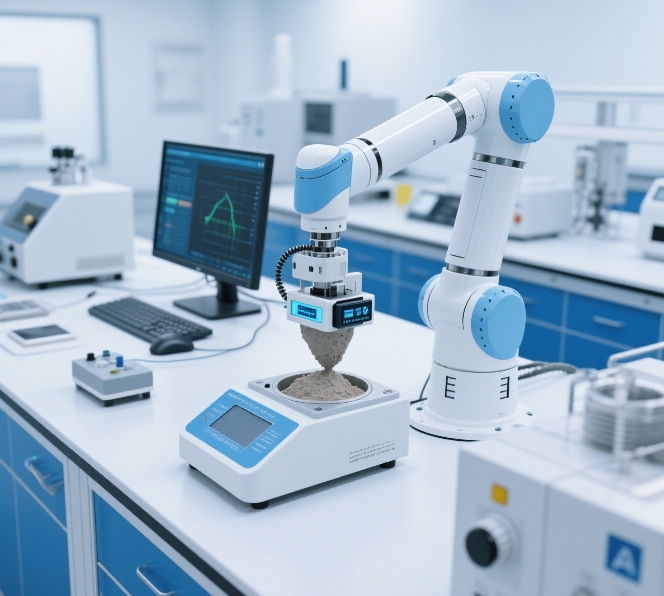-
ContactIs a professional manufacturer of construction machinery integrating research and development, manufacturing, sales, installation and after-sales service.
-
ProductsContactIs a professional manufacturer of construction machinery integrating research and development, manufacturing, sales, installation and after-sales service.
-
ContactIs a professional manufacturer of construction machinery integrating research and development, manufacturing, sales, installation and after-sales service.
Intelligent AI: The "Smart Brain" of Dry-Mix Mortar Production Lines
When dry-mix mortar production lines meet AI, it’s like equipping traditional production with a "smart brain"—one that can precisely solve pain points in formulation, mixing, storage, energy consumption, and other links, making production more efficient, stable, and hassle-free.
Jul 21,2025

When dry-mix mortar production lines meet AI, it’s like equipping traditional production with a "smart brain"—one that can precisely solve pain points in formulation, mixing, storage, energy consumption, and other links, making production more efficient, stable, and hassle-free.
First, AI makes formula design smarter. Dry-mix mortar formulas vary widely: tile adhesives need strong adhesion, plastering mortars require workability, and each formula must balance the ratios of cement, sand, and additives. Traditional trial-and-error methods rely on experience, wasting materials and struggling to balance multiple properties. AI can "digest" historical formula data—such as relationships between sand fineness, additive dosages, and mortar strength or water retention—to quickly calculate optimal ratios. If raw materials fluctuate (e.g., changes in sand moisture content), AI adjusts in real time to ensure stable mortar performance while reducing waste of cement or additives.
During production, AI acts as a "precision manager." Dry-mix mortar uneven mixing—local agglomeration directly harms construction results. AI uses sensors to monitor particle distribution and equipment speed in mixers in real time. If uneven mixing is detected, it immediately adjusts stirring time or speed, ensuring every grain of mortar meets uniform standards. Drying processes are also optimized: AI adjusts dryer temperature and duration based on initial moisture content of raw materials (e.g., sand, lime), ensuring thorough drying without energy waste.
AI even tackles the "agglomeration dilemma" in storage. Dry-mix mortar absorbs moisture and clumps easily, potentially turning into "hard lumps" in silos. AI monitors warehouse temperature and humidity in real time; if humidity exceeds standards, it activates dehumidification equipment. It also predicts caking risks using historical data (e.g., before the rainy season), arranging advance silo transfers or adding anti-caking agents to keep mortar loose.
Packaging and testing become more precise, too. AI controls packaging machine accuracy to avoid overfilling or underfilling. It also uses image recognition to inspect bag seals—even tiny cracks are flagged immediately, preventing moisture absorption and deterioration during transportation.
AI excels in supply chain and equipment maintenance. It analyzes inventory and shelf life of raw materials (e.g., gypsum, fly ash), predicts demand based on production plans, and avoids expired stockpiles. By monitoring equipment vibration and current data, it anticipates issues like mixer blade wear or crusher bearing aging, prompting maintenance to reduce sudden downtime losses.
Energy consumption and environmental protection become more manageable. AI identifies "inefficient moments" (e.g., idle dryers) and adjusts operations automatically. It monitors dust emissions, activating dust removal systems when standards are exceeded—saving costs while ensuring compliance.
Ultimately, AI brings dry-mix mortar production lines full-process "precision control" from formula to finished product: less trial-and-error waste, fewer human errors, more stable quality, and hassle-free management. This not only boosts efficiency but also helps dry-mix mortar—a basic building material—better meet the precise needs of diverse projects.
Request Quote
Note: Please be sure to fill in the information accurately and keep communication open, we will get in touch with you as soon as possible
Cookie
Our website uses cookies and similar technologies to personalize the advertising shown to you and to help you get the best experience on our website. For more information, see our Privacy & Cookie Policy
Cookie
Our website uses cookies and similar technologies to personalize the advertising shown to you and to help you get the best experience on our website. For more information, see our Privacy & Cookie Policy
These cookies are necessary for basic functions such as payment. Standard cookies cannot be turned off and do not store any of your information.
These cookies collect information, such as how many people are using our site or which pages are popular, to help us improve the customer experience. Turning these cookies off will mean we can't collect information to improve your experience.
These cookies enable the website to provide enhanced functionality and personalization. They may be set by us or by third-party providers whose services we have added to our pages. If you do not allow these cookies, some or all of these services may not function properly.
These cookies help us understand what you are interested in so that we can show you relevant advertising on other websites. Turning these cookies off will mean we are unable to show you any personalized advertising.
Inquiry:
WhatsApp:
Email:
导航下拉添加类名.active
在线客服添加返回顶部
右侧在线客服样式 1,2,3 3
表单验证提示文本: Content cannot be empty!
循环体没有内容时: Sorry,no matching items were found.
CSS / JS 文件放置地

